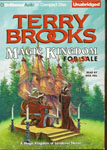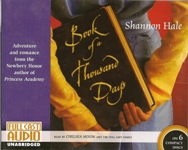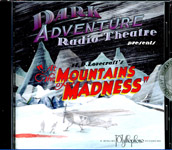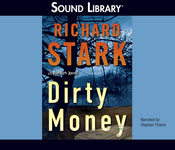
 Magic Kingdom For Sale: SOLD!
Magic Kingdom For Sale: SOLD!
By Terry Brooks; Read by Dick Hill
12 CDs – 14 hours – [UNABRIDGED]
Publisher: Brilliance Audio
Published: 2008
ISBN: 9781423350125
Themes: / Fantasy / Magic /
If you like a big, heaping helping of vanilla with your fantasy, you’ll probably like the flavor of Terry Brooks’ Magic Kingdom for Sale: Sold. Me, I’m a New York Super Fudge Chunk guy and I thought Magic Kingdom tasted lousy.
Yeah, that’s harsh. If you don’t have anything nice to say, don’t say anything at all, etc. etc. But I have an obligation to review Brooks’ work for two reasons: I owe it to this website, and I figure I might steer away a couple potential readers who might stumble with tragic results into the banal minefield that is Magic Kingdom.
To be fair, Brooks can write, in terms of stringing grammatically correct sentences together. I’ve read much, much worse stuff than Magic Kingdom. I also have fond memories of Brooks’ Sword of Shannara series, which I read as a teenager and liked (although I knew even then that they were derivative of Tolkien). But I’m afraid to revisit Shannara these days, especially after Magic Kingdom. I just know its not going to hold up.
Magic Kingdom is the tale of Ben Holiday, a 40-year-old lawyer burned out with his profession and his life, having lost his wife to a car accident and finding no satisfaction in his work. While thumbing through a specialty catalog he finds a literal magic kingdom for sale for a million bucks and decides to make the purchase. The broker, a wizard, whisks Holiday away to the fantastic realm of Landover, a once shining kingdom now in serious decline. The land is failing and the great castle of Sterling Silver is tarnished because Landover has been without a king for 20 years.
Holiday soon finds out that he’s not the first king to try to ascend to the throne in that time, however. Far from it. Instead, he’s been duped by the broker, and learns that dozens of previous kings have failed before him, and were meant to. Landover’s peoples are bitter and disenchanted with the string of would-be kings turned failures, and Holiday has a fight on his hands to win their pledges.
But Holiday has help in the form of a doddering old wizard (Questor), a talking dog who once served as a court scribe (Abernathy), a beautiful shape shifting sylph named Willow, a pair of Kobolds, and a pair of hairy, grubby, earth-tunneling gnomes.
The biggest problem I had with Magic Kingdom is that this is kids’ stuff, but it’s not labeled nor probably intended as such. I don’t buy that Magic Kingdom is written for an adolescent audience: its clearly marked as “adult fiction” on the cover of the audiobook I’ve reviewed. Nor is its subject matter for adolescents: At its heart it’s about a man’s middle-age crisis, hardly the stuff to captivate a young audience. And because Magic Kingdom doesn’t know what it wants to be, it suffers mightily. I enjoy good adolescent fantasy lit–C.S. Lewis’ The Chronicles of Narnia and Nancy Farmer’s The Sea of Trolls, for example, are terrific reads for folks of any age–but Magic Kingdom failed to satisfy my grown-up tastes, or my childhood love for good, simple stories.
Secondly, Landover as a world is completely unrealistic and devoid of any personality or charm. With generic place names like “The Greensward,” “the Deep Fell,” “The Wasteland,” and “The Mountains of Melkor,” Landover may as well be anywhere fantasy USA. And the way Brooks describes Landover you’d think it was the size of a postage stamp–two sentences of description here and there and Holiday and his crew have traversed the whole continent without breaking a sweat.
Thirdly, I didn’t much like the main character. There’s nothing to dislike about Holiday, but there’s not much to like, either. He’s bland and featureless. Holiday stumbles around most of the story, avoiding scrapes by luck or occasionally pluck and wit, but mostly because he’s “fated” to become king. He’s revealed as the chosen one almost from the outset of the story, so there’s really no tension or doubt that he will ascend to the throne of Landover. I also found his companions extremely annoying. The kobolds, gnomes, and even Abernathy and Questor resemble a troupe of circus clowns who are there to provide levity, a sounding board for Holiday’s questions, and occasionally bail him out of trouble, but do little else.
Fourthly, the underpinnings of the story have some serious flaws and holes. We find out that the evil wizard who “sells” Landover to Holiday is doing it for the money. Keep in mind that this is a wizard who has powerful magic at his disposal—and can use it freely on Earth—but can’t seem to figure out how to use it to make a few honest bucks. Lame. Brooks draws some extremely tenuous connections between the health of the king and the health of the land, an old Arthurian trope that is not at all developed in Magic Kingdom. Other than a few brief mentions of blighted crops, swirling mists and gloom, and some unhappy farmers, there’s no overt suffering, darkness, or disease, nor any explanations about why a king is needed to restore the land’s health. In short, I had no emotional investment in whether Holiday succeeded or failed in his mission because I didn’t find myself caring about him or the plight of Landover. By the conclusion of the story I was simply glad to see it end.
I could go on and on with the criticisms (the evil wizard allowed Holiday, a brilliant lawyer and a golden gloves boxer, to buy Landover because he thought Holiday was a good candidate to fail at becoming king?) but it’s like shooting ducks in a barrel. I do think there is an audience for Magic Kingdom, and you could do worse if you’re looking for a brainless beach read, but suffice to say that it’s not for readers like me.
I will conclude on one positive note: Narrator Dick Hill does an admirable job holding this mess together with a fine reading voice. His work depicting Questor and Strabo, the dragon, is nicely done, and adds value to the audiobook.
Posted by Brian Murphy



 The Caves of Steel
The Caves of Steel


 Dirty Money
Dirty Money